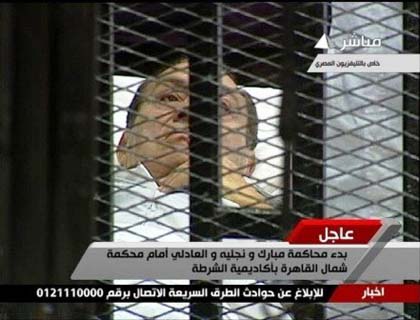Egypt - Egyptians and their fellow Arabs were enthralled on Wednesday by the unprecedented sight of ousted president Hosni Mubarak, a leader of the region for three decades and the Arab Spring's biggest scalp, being wheeled into court to face trial.Outside the courtroom in Cairo, they watched on a big screen as the octogenarian, who ruled Egypt for 30 years, lay on a hospital bed connected to a drip and denied involvement in the killing of protesters who ousted him.
"I don't believe this ... to see a president being tried ... I never imagined it. I am so happy, I feel tomorrow will be better and that the next president knows what could happen to him if he goes against his people," Ahmed Amer, 30, an employee in a water service company, said outside the court complex.Egyptians crowded into cafes, kiosks, anywhere with a television to follow the trial. Traffic on Cairo's notoriously clogged streets thinned, as people in Egypt and across the Arab world watched what many saw as history in the making.
Some thought it would inspire those protesters trying to oust their own leaders, such as Syria's Bashar al-Assad, who has used his military to try to crush an uprising against his rule."The trial no doubt inspires Syrians and raises their hopes of the victory of their cause for freedom...to see those implicated in the bloodletting of Syrians and theft of the wealth of Syria put behind bars," said Imadeddin al-Rashid, an Islamic law professor who fled Syria.
The opening of the trial coincided with a push by Syrian forces into the heart of Hama.In Yemen, protesters were glued to small television sets they had brought into the tents where they camped out in Sanaa.Mubarak was not the first Arab leader to fall in the Arab Spring, but he is the first to stand trial in person. Tunisian President Zine al-Abidine Ben Ali, who was toppled first, fled to Saudi Arabia and was tried in absentia.There are contrasts with the trial of Iraq's Saddam Hussein, kicked out of office by a U.S.-led force and not his own people.
If convicted, Mubarak could face the death penalty, though few expect that outcome even if some protesters wish it. 'Idiotic people'Inside the cage with Mubarak, 83, were his two sons, Gamal, once viewed as a future president, and Alaa, who had business interests. They too denied the charges. Alongside them, were former Interior Minister Habib al-Adli and other officials.
Some dismissed the proceedings. A government adviser in Saudi Arabia, a key U.S. ally that tolerates no dissent and has no political parties, criticised putting Mubarak on trial."You realise that these idiotic people are going to destroy whatever is left of the Egyptian state, this is a masquerade," the adviser said. "This is a humiliating spectacle for everyone. There us nothing to be proud of. Time will tell."
But the dramatic images won over some Egyptians who have been frustrated by the protests that have disrupted their lives."I used to oppose the revolution at first. I criticised the youth in Tahrir Square and those who protested. But seeing that their efforts have finally brought this pharaoh to court, I must say that I salute the revolution and the youth of Egypt," said Ali Abdullah, a shop owner in Sharm el-Sheikh, the Red Sea resort where Mubarak was exiled and in hospital after he quit.
Egyptians blame Mubarak for economic policies they say filled the pockets of the rich while many of the nation's 80 million people scrabbled in squalor to feed their families. They are also angry at his repression of any opposition.Mubarak talked to his sons inside the cage and occasionally lifted his head to watch the proceedings. Many Egyptians see his illness as a ruse to gain sympathy and had thought the army might use it to avoid bringing him to trial in person.
"Why is he on a stretcher? Is he handicapped? This is playing on people's emotions so we can all start crying over an old man," Mohamed Naguib, 32, said in Sharm el-Sheikh.But the images of Egypt's former president and a war veteran, who always presented himself as a father figure protecting the nation, gained him some sympathy.
"I am sad, really sad. I never imagined to see my president lie on a bed like this. After all he is an old man, there should be mercy.. But I don't care for his sons, they can do what they want with them," said Khaled Hassan, 41, a plumber.Earlier, pro- and anti-Mubarak protesters faced off outside the courtroom and some in the two groups hurled stones at each other. Hundreds of police intervened to calm them down.A small pro-Mubarak rally of men, women and children chanted: "O Mubarak hold your head high".

